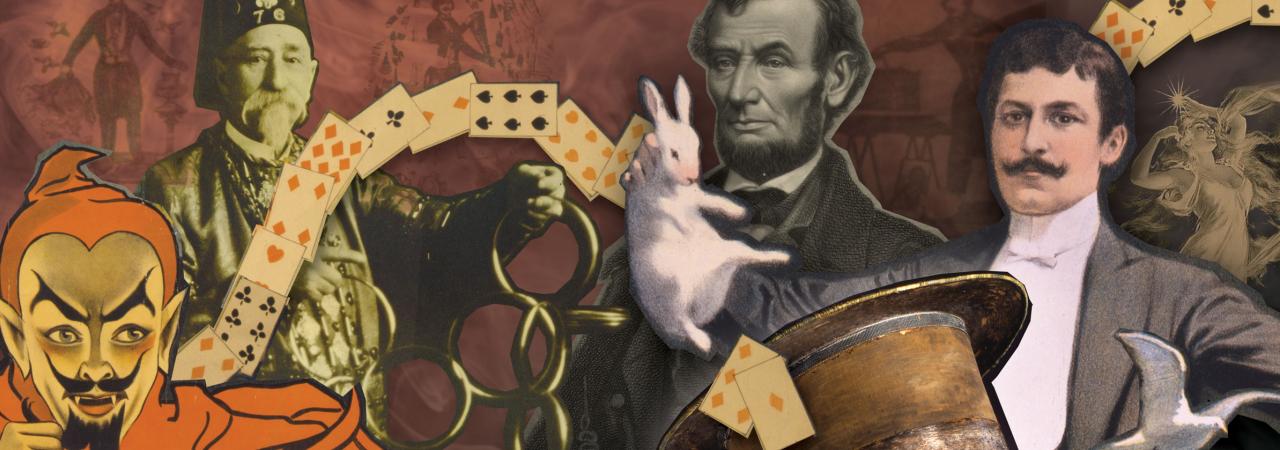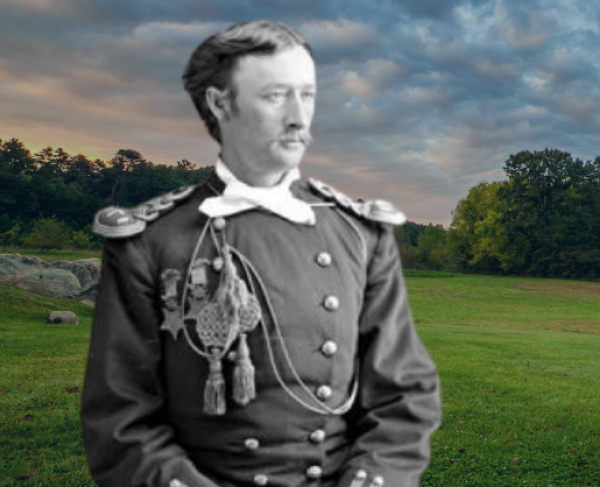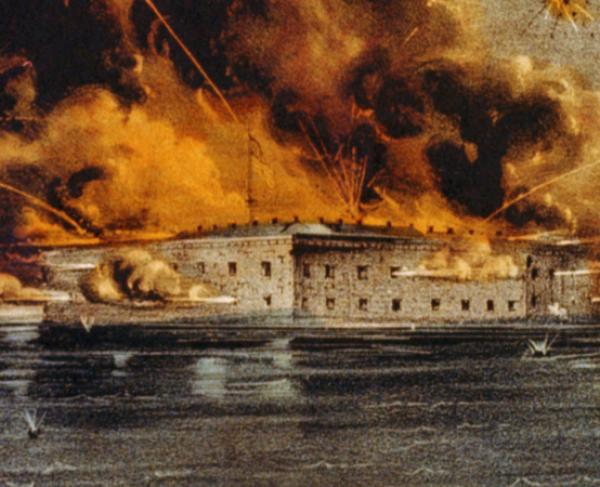
President Abraham Lincoln was a relentlessly curious man, seeking knowledge and entertainment at every turn. With the many lines he read and extraordinary sights he saw, it is no wonder he was known as an enchanting storyteller. But it wasn’t always stories that Lincoln offered to an audience! As a young man, he was quite taken with magic tricks and would perform rudimentary ones of his own for anyone willing to watch. His fascination grew with age, even continuing into his time in the White House. During this time, his path crossed with several magicians, including Horatio “Harry” Cooke, “Wyman the Wizard” and “Signor Blitz,” as well as Compars (Carl) and Alexander (Leon) Herrmann.
Horatio “Harry” Cooke
In 1864 Lincoln met an enchanting young soldier that went by the name of Horatio “Harry” Cooke. After enlisting with the 28th Iowa Volunteer Infantry, Cooke had become known not only for his beautiful penmanship (he had written correspondence for Generals Grant, Rosecrans, Sherman, and Sheridan) and expert marksmanship, but also for shocking escapes and other tricks performed in camp. So, while Cooke was en route to a new assignment in the Shenandoah Valley in 1864, he was called away to the Washington, D.C., office of Secretary of War Edwin Stanton. Upon entering, he was met by Generals William T. Sherman and Winfield S. Hancock, Secretary Stanton, attorney and orator Robert Green Ingersoll, Senator Isham Harris, and, to the young Cooke’s surprise, President Lincoln — who shook his hand and said, “Well lad, I am informed that you are rather tricky.” With that, it was decided that his abilities would be demonstrated, and he was tied up with 50 feet of rope. When all was set, Cooke asked Lincoln to walk ten feet away... and then proceed to walk back towards him. In those ten feet, Cooke set himself free in time to shake hands with the President when he was within reach. An amazed Lincoln appointed Cooke a Federal Scout via handwritten letter, which led to his becoming a captain and “Chief of Lincoln’s Scouts.”
As Lincoln’s number one scout, Cooke was constantly challenged. But perhaps his most daring escapade came when he and his scouting party were taken prisoner by Mosby’s Rangers during the 1864 Shenandoah Campaign. All their valuables were stripped off them, including Cooke’s prized letter from President Lincoln. In the end, Cooke pulled off yet another escape act, but he was not able to save all his scouts in the process — a loss that haunted him and drove him through the remainder of the war. Upon its end, the captain set his sights on requesting a new letter and went to visit the White House on the evening of April 14, 1865. However, he was informed that the President had gone to Ford’s Theatre. So, Cooke went to the theater and later described what he saw in his diary:
“About twenty minutes after I entered, I heard a pistol shot, at the same moment a man (whom I soon learned was J. Wilkes Booth) jumped from the President’s box to the stage; he fell but got up again, and shouting some Latin phrase, ran through the scenery and out the backstage door. At first the audience seemed to think the incident was part of the play, but someone shouted from the stage, ‘The President has been shot!’”
Wyman the Wizard
President Lincoln was also a fan of “Wyman the Wizard,” having strolled over to see him at least four times at Odd Fellows Hall, which was halfway between the Capitol and the White House. The first prominent American-born magician, John Wyman Jr., began his mystical career by performing at Peale’s Baltimore Museum — which is, today, the oldest museum building in the United States! While his show route first took him to many small-town schoolhouses, he became a big name and even bigger moneymaker, performing in Richmond, Charleston, Boston, New York, and Washington. Before President Lincoln, Wyman had also mesmerized Martin Van Buren and Millard Fillmore. His tricks included catching a fired bullet, pouring whatever audience members desired from an “inexhaustible bottle,” the “egg bag,” coin magic and the “Sphinx illusion.” Other parts of his act utilized marionettes, ventriloquism, and memory feats. He also kept audience members on the edge of their seats with the promise of gifts, such as gold and silver watches, table sets, family bibles and more — that were given based on a drawn number corresponding to a seat in the crowd. A show of wonder, Wyman’s tricks would’ve provided momentary joy to the often-distressed President Lincoln.
Signor Blitz
In another magical encounter, President Lincoln had stepped away from matters of war to attend an 1863 Fourth of July parade in Washington, D.C. In the parade was one of the most famous men in America, English-born Signor Blitz, who shocked everyone when he pulled a bird from the hair of a girl on the parade route. He continued to dazzle the crowd with sleight-of-hand tricks and even whisked an egg from the mouth of little Tad Lincoln. The President took note and invited the magician to the White House, where Blitz made a bird appear from Lincoln’s famously tall hat. The bird even boasted a note on its wing that declared “Victory, General Grant” — referencing the long-fought and just-concluded campaign to capture Vicksburg. It’s been said that Lincoln asked Blitz how many children he’s made happy with his career, to which Blitz responded, “Thousands and tens of thousands.” Lincoln reportedly lamented, “I fear that I have made thousands and tens of thousands unhappy.”
Going by the stage name of Signor Blitz, Antonio Van Zandt had come to the U.S. in 1834 when he was approximately 24 years old. With a love for making people laugh, he crafted a clever stage act and began performing in saloons and theatres, or at charity acts. Like “Wyman the Wizard,” Blitz also amazed with the “bullet catch.” During the war, the Philadelphia-based magician constantly performed at the local depot for sick and wounded soldiers, totaling an estimated 132 shows for 63,000 soldiers.
Compars and Alexander Herrmann
While the war was in its initial year, President Lincoln had much cause to fret, but he still found time to enjoy being entertained by the Herrmann brothers — Compars, otherwise known as Carl, and his much younger sibling, Alexander. In the East Room of the White House in November 1861, the elder Herrmann took the lead in mystifying the President, his cabinet, and a group of military officers. When he asked Lincoln to shuffle a deck of cards, the nation’s leader passed them to his Secretary of War, Simon Cameron, claiming, “This gentleman shuffles the cards for me at present.” Only two months later the sibling duo returned to perform again, this time for the President, his cabinet, and First Lady Mary Todd Lincoln. Compars performed the “inexhaustible bottle” trick, pouring an array of drinks from the baffling container — including tea, requested by the first lady.
Compars Herrman, self-proclaimed the “First Professor of Magic in the World,” was a name that carried weight in Europe, where he had performed for royal patrons like Emperor Franz Josef I of Austria, King Ludwig of Bavaria, and Queen Isabella II of Spain. When Alexander was a mere boy, his brother Compars — a whole 27 years older — brought him on as his assistant and introduced him to the world of magic. After embarking on their American tour in the 1860s, Alexander decided to make the U.S. his home. He went on to become “Herrmann the Great,” and performed the “bullet catch,” the Houdini-inspired aerial suspension trick, and the classic rabbit appearing from a hat.
In all the magical, mystical tricks he was shown, President Lincoln retained a love for the mind-boggling feats and laugh-inducing scenes that magicians brought to life. Perhaps it was the sense that the impossible was made possible that intrigued him? Maybe he wanted to figure out the mechanics behind their tricky ways? Whatever the reason for Lincoln having a magnetic pull to magic, it can certainly be said that the joy elicited from these shows was greatly welcomed in the life of an often-afflicted President.


